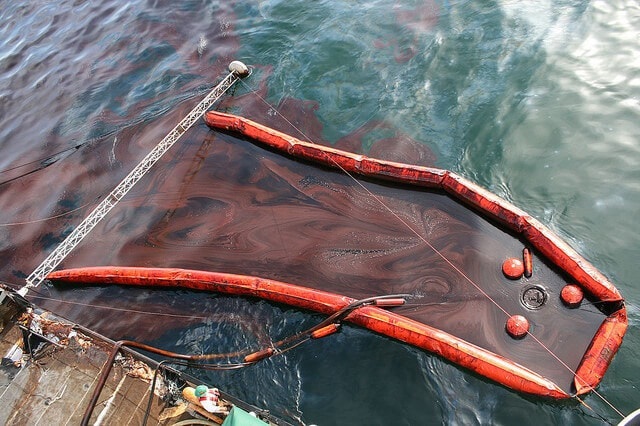Contamination from oil is an immense and growing global issue, impacting not just the natural ecosystems of lakes, rivers, and oceans but the industrial processes that affect our daily lives. The consequences of oil spills into a body of water can be devastating; marine life and wildlife can be killed, delicately balanced food chains disturbed, and drinkable water polluted. These disasters often originate with an accidental spill from a tanker ship in the ocean, a fishing boat in a river or lake, or a terrible disaster in an oil-production area. Oil, however, can be part of the industrial process as well, with waste products leaking into rivers and canals or a mixture of water and oil from manufacturing machinery in the works. When water ends up mixed with the oils used in lubrication or production, using water in machinery without a purification system can degrade components, cause machinery to break or fail, and increase the cost of waste disposal.
Oil removal is essential for two key reasons: the environment and productivity. Without oil removal, the oil often runs off into the ground and trickles into areas that stabilize the environment. Those areas cannot be reversed, so life as we know it becomes polluted and eventually ruined. This is why it is so important to remove oil before it contaminates the environment. However, the other factor is more straightforward to understand – productivity. Oil carried into machinery leads to jams, efficiency losses, and eventually mechanical failure, leading to costly downtime, maintenance, and repair costs. Collected oil can reduce the cost of waste disposal for businesses several-fold and avoid unnecessary fines for not adhering to environmental laws.
How Oil Skimming Works
Although technically complicated, the basic principle of oil skimming is straightforward. Since oil has a lower density than water, it collects on the surface when mixed with it, facilitating its efficient and clean separation. The physical process here could be as simple as a skimming machine fitted to a vessel that scoops up and drains oil while retaining the water. Oil skimmers can take shape as belts, disks, weirs, and tubes that collect oil from the surface of a body of water, channeling it for storage for reuse or formal disposal. Oil extraction and refinement produce a large amount of contaminants that are difficult to dispose of properly. Such simple oil skimming capabilities can be upscaled from small pharmaceutical-grade manufacturing setups to massive industrially pumped and extracted oil fields.
Specific applications and industries utilizing oil skimmers
Oil skimming finds application in all major industries: in industrial manufacturing, skimmers can be found in coolant tanks, in wash systems, and at the wastewater treatment plants of manufacturing facilities; in refineries and steel mills, cores form incrusted and high-temperature coolants and lubricants and need to be removed constantly to avoid a dramatic performance drop; or in food processing plants that need to keep their equipment running trouble-free over long timeframes. In environmental applications, oil skimmers are widely used in responses to oil spills in oceans, rivers, lakes, or areas where environmentalists are set to keep an eye on gas and oil survey operations, where oil needs to be removed quickly to minimize ecological damage. Within the transportation segment, shipping is most heavily reliant on oil skimming technology. In order to keep this segment of the global economy running, leaks and spills from vessels need to be handled thoroughly. Oil skimming is a critical technology for safe operations.
Benefits of Oil Skimming Technology
A. Environmental benefits: preventing water pollution and protecting marine life
Oil skimming technology helps to reduce water pollution by subtracting harmful oil from the surface of the water before it can spread. This is extremely important since marine life can be heavily affected by oil entering a waterway. Oil can be ingested by fish and other aquatic animals when it is accidentally ingested with their regular diet. Another situation in which oil can affect marine life is when it gets submerged in water along with its toxic chemicals. It can cause a breakdown in ecosystems and a suffocation effect on certain animals. When oil is removed quickly from the water’s surface using oil-skimming technology, these outcomes are circumvented, helping to keep the water cleaner and safer for our marine friends.
B. Economic benefits: reducing disposal costs and recovering valuable oil
Another significant economic benefit of oil skimming technology is the potential to recover useful oil. Instead of pumping your oil-contaminated water through the sewer and facing the expense of disposing of it as hazardous waste, you can recover the oil with skimmers for possible use in recycling it in processing. Using the oil reduces overall waste and, depending on the value of the recovered oil, can reduce the cost of your skimmer over time. Plus, agencies are more likely to ignore recalcitrant dischargers, knowing that they are at low risk of regulatory penalties if oil-contaminated waste gets pumped away. Long-term cost savings and the potential for continuous profitability can result from the use of skimmers.
C. Operational benefits: maintaining equipment efficiency and reducing downtime
When oil gets into industrial equipment, it can cause all sorts of havoc. For example, oil can mix with water in cooling systems or production processes, causing the oil to behave in a suspended state. As the oil floats in the water, it can get into equipment and clog the machinery. This can cause all sorts of problems, from breakdowns to inefficient use of machinery and even having them wear out sooner than expected.
Oil skimmers can help a lot by continuously removing oil from the water. This prevents oil and sediment from entering the equipment, keeping it clean and functioning optimally.
This can help your business by reducing oil buildup in critical systems. It can avoid equipment failure and ensure that your operations keep running. Thanks to fewer breakdowns, your production won’t be interrupted, maintenance costs will be lower, and equipment will last longer.
Challenges and Solutions
Although oil skimming is an effective technology, there are several obstacles to overcome before implementing it in real situations. Different kinds of oil behave differently in water: light oils can quickly spread to a large area of water surface, while thicker oil might be difficult to separate; the environmental differences such as water currents, temperature changes, or foreign matter inside the wet surface could decrease the effectiveness of skimming operations; for some factories due to their routine operations, they might face trouble in integrating the oil skimming into their operation system without interrupting the work or affecting the process.
Some of these limitations can be addressed by improving the materials and designs of the equipment used to perform oil skimming. Today’s skimmers can be fashioned out of materials that can withstand uglier environments, resist many forms of corrosion, and be adapted for greater collection powers that work automatically, reliably, and often take into account fluctuations in liquid.
Conclusion
Oil skimming technology remains an indispensable tool for fighting different forms and impacts of oil contamination. It offers reliable in-place oil spill recovery, efficient oil-water separation, the potential for cost savings, a decrease in oil-water separation equipment downtime, and direct environmental benefits. These and many other additional benefits can undoubtedly be achieved with the help of oil skimmers, which is why oil skimming technology should remain a leading solution in combating problems of oil contamination for many years to come.
Oil skimming has a multitude of advantages to industries, which should encourage the adoption and continued enhancement of their skimming processes in order to profit both from their ability to protect the environment as well as create better and more cost-effective operations. Innovations in skimmer design and the creation of material can provide high-quality oil skimmers at a cheaper cost than before. With a very positive future ahead, an ideal time lies for industries to find out how oil skimmer can help them increase their operations, safeguard the environment, and promote a green as well as a sustainable business operation.
Read More: Risks Associated with Mutual Funds










